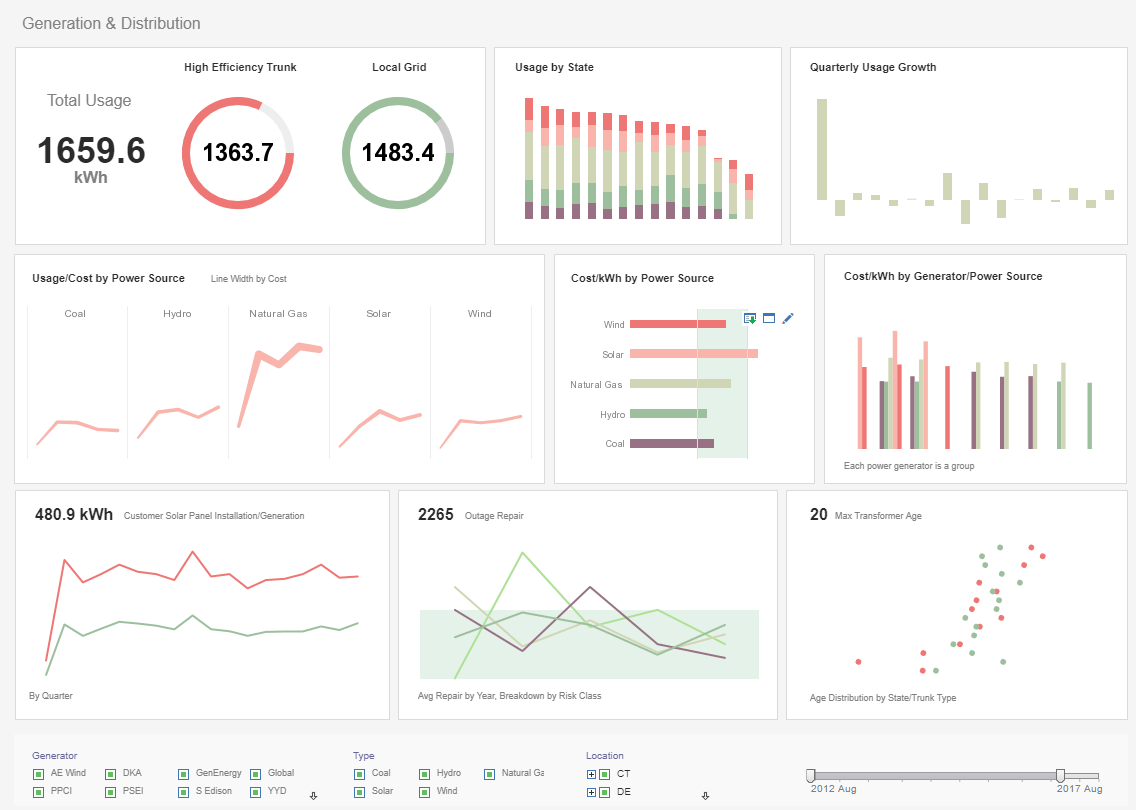InetSoft Webinar: ROI from Smart Grids and BI
This is the continuation of the transcript of a Webinar hosted by InetSoft on the topic of "Business Intelligence in Utilities Industry" The speaker is Jessica Little, Marketing Manager at InetSoft.
Interviewer: For people who don’t know, how is BI relevant to smart grids?
Jessica Little: Well, the smart grid, it’s really a way for utilities to operate their electric system in a smarter way. They do that based on additional intelligence and information and it comes from a couple of different sources. It comes from the operation, their grid where they have more sensors on their transmission and their distribution system.
Interviewer: Right.
Jessica Little: This allows them to collect information from their customers where they are reading meters. They traditionally have been read only once a month. Well now it reads those meters as often as every 15 minutes and it can actually do it on domain.
Domain is a little bit unfortunate because it kind of implies that the current grid is dump.
Interviewer: No, we are not saying that.
Jessica Little: So it should be smarter grid.
| #1 Ranking: Read how InetSoft was rated #1 for user adoption in G2's user survey-based index | Read More |
Interviewer: Smarter grid. That's right.
Jessica Little: Better term.
Interviewer: But is that information pretty valuable?
Jessica Little: Correct. It is, especially when it comes to dynamic pricing for example. The utilities there can definitely do a fantastic job in the future. Actually offering different rates to different customers is where business intelligence is going to be at a core front of the smart grid. You also know that there is much more than pricing. It’s also about you having more of renewable power sources that come from wind farms, solar plants, etc. Those things are very unpredictable. Using wind as an example, you have it for half an hour and then you don’t have anything. You have to manage all these resources and that’s where business intelligence is going to be a key component of future decision making of utilities.
Interviewer: Okay, it makes sense. Now you talked a little bit about the value, the business value of the information. How do you get ROI from BI deployment?
Jessica Little: The key really is you can do it in phases. I you look at the big picture, it can easily be overwhelming when you think about the investment while fundamentally changing every aspect of your business. The effective way to really do it successfully is to implement it in phases and implement a portion of the technology and start reaping the benefits of that sooner, rather than later. That way you know the investment can pay for itself as it goes.
Interviewer: Right, you don’t have to do it all in one big bang.
Jessica Little: That's exactly right.
Read what InetSoft customers and partners have said about their selection of Style Report as their production reporting tool. |
Interviewer: Okay, good.
Jessica Little: And a number of utilities are doing that these days. I mean we have one utility we are working with that has a smart grid pilot that they are implementing. They are in the process of implementing that but at the same time, they are also using their data warehouse and applying business intelligence to merge several different data marts which have enabled them to reduce their unbilled revenue significantly. So ultimately it’s saving them, in the near term, millions of dollars as they are just getting into implementing their smart grid.
Interviewer: Okay good.
Jessica Little: Let me comment on this a little bit more. In phase growing deployment, ROI for BI is actually, from the get-go not that simply assessed. It’s kind of a catch 22 problem because you don’t really have reliable data to measure your ROI. So if you start with a small deployment for example, then out of the deployment you get high quality data in measurements and KPI’s and then you can make a much cleaner case for future, say expansions based from ROI numbers.
| Previous: What Future Trends are Coming to BI? |



